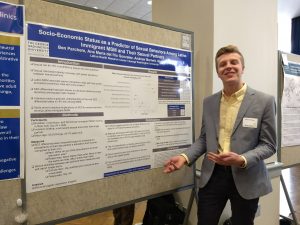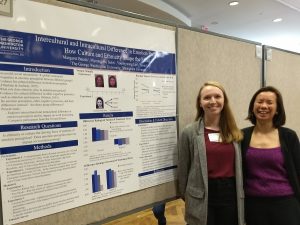Congratulations to undergraduate Psychology major, Frances Cooke, who was one of the Research Days Undergraduate Essay Contest Winners for her Reflection on Research and Scholarship. She will receive a $150 prize. And, hats off to Dr. Phil Moore for his dedicated mentoring of our talented undergraduates!
FitBits and Faculty: An Essay on Research and Professors Who Inspire Us
Nearing the end of my junior year, I am increasingly grateful for the opportunities GW has awarded me, especially through its elite academics. Important decisions regarding my future career in the field of psychology are approaching at a daunting pace, but I am comforted when I remember that GW has provided me with unique experiences that many students only dream of having under their belt in their third undergraduate year. One project in particular resonates as an invaluable research experience that prepared me for success in any career.
Dr. Phillip Moore runs a fast-paced health psychology lab in which professors, graduate students, and undergrads collaborate on projects regarding diet, exercise, and other facets of health behaviors. The project I have devoted myself to is a study assessing the effects of social media use and mobile technology, specifically FitBits and health-tracking apps, on nutrition and physical activity. Over the course of three pilot studies, we tracked students’ daily exercise or eating habits, and had them participate in forum-style social media interactions on particular health topics. My role as a research assistant consisted of background research for literature reviews, editing the proposal for approval from an Institutional Review Board, and running participants through experiment protocols.
The most “Only at GW” moment of this project arose in the third pilot study, when the lab was granted permission to work with students from the School Without Walls. The high school is located directly across the street from the Psychology Department building where our lab is stationed, giving us the unique opportunity to conduct research with high school-aged students while utilizing the university’s quality facilities.
Participating in a project of such extensive time and ambition allowed me to recognize the value of a university that encourages professors to involve students in the development and execution of their research. Not only have I been able to cultivate an experience that is unique for an undergraduate, but my role in this study helped contribute to areas of research that have not been fully explored. Specifically, our lab is at the helm of research on mobile technology and health, a new and rapidly expanding area of interest in health psychology. Smartwatches and health apps are everywhere we look, and this lab experience has revealed the importance of pursuing areas of research that have immediate applications to the health and wellbeing of various populations.
I am extremely grateful to Dr. Moore as a mentor. In addition to being a leader at the forefront of new health psychology research, Dr. Moore is one of the most generous and caring people I know, demonstrating genuine interest in each of his assistants’ passions and career aspirations. In the lab, we are well-guided and informed, but Dr. Moore also puts a lot of faith in us as independent researchers, entrusting us to run participants through experiment tasks and take initiative on research assignments.
My future career choice is an intimidating topic, as I am fascinated by many areas of psychology. However, I can credit my experience in Dr. Moore’s lab for spurring my interest in the psychological influence on health behaviors, something I hope to study in the future. From a pragmatic standpoint, my position in this lab has given me research experience that some only receive later in their career, meaning that I will be one step ahead when applying to graduate programs. On a more introspective note, this research experience will allow me to succeed in whatever I end up choosing to do, because I have learned the impact of research in improving lives, as well as the power of passionate people collaborating for one scientific goal.
As an undergraduate research assistant, I consider myself a representative of the scientific community, and a liaison for GW’s goal of progressing empirical research in a broad range of academic fields. My involvement in Dr. Moore’s lab has been one of the most influential in shaping my place as a driven pursuant of knowledge at a research institution. I am grateful for my increased understanding of the relationship between psychology and physical health, as it has shaped both my career and personal health choices: I now wear a FitBit every day! Even if I choose a clinical instead of research-oriented path, I now understand that research is an integral part of a student’s development, as it emphasizes contributing to a paradigm of pursuing knowledge and truth that has been the bedrock of education for hundreds of years.





